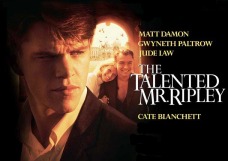| The
Talented Mr. Ripley |
| |
|
|
USA, 1999. Rated R. 139 minutes.
Cast: Matt Damon, Gwyneth Paltrow,
Jude Law, Cate Blanchett, Philip Seymour Hoffman, Jack Davenport, James
Rebhorn, Sergio Rubini, Philip Baker Hall, Celia Weston, Stefania Rocca
Writer: Anthony Minghella (from the novel by Patricia Highsmith)
Music: Gabriel Yared
Cinematographer: John Seale
Producers: William Horberg, Tom Sternberg, Paul Zaentz
Director: Anthony Minghella
|
| Grade:
A- |
Review
by Dana Knowles. |
 om
Ripley (Matt Damon) is a nobody who yearns to be a somebody. He's a working-class
chameleon with highbrow tastes. Fortune smiles upon Tom in the form of an offer
from industrial magnate Herbert Greenleaf (James Rebhorn), who mistakes Tom
for a friend of his son Dickie's, and hires him to travel to Italy and pursuade
Dickie to return to New York. Quite a task, considering that Tom does not--in
truth--know, nor has he ever met Dickie. Still, the offer is too good to pass
up, and soon Tom is travelling first class on a luxury liner to Europe. He knows
practically nothing about his prey, except that Dickie is a rabid jazz fan and
an alum of Princeton who now lolls about Italy in hedonistic splendor. Tom does
what he can to study up, though... immersing himself in jazz until he can recognize
individual artists and pieces, and stalking Dickie upon arrival in order to
determine as much as he can about his habits. And thus begins Tom's soon-to-become-deadly
process of assimilation into a world that has no place for the real him.
om
Ripley (Matt Damon) is a nobody who yearns to be a somebody. He's a working-class
chameleon with highbrow tastes. Fortune smiles upon Tom in the form of an offer
from industrial magnate Herbert Greenleaf (James Rebhorn), who mistakes Tom
for a friend of his son Dickie's, and hires him to travel to Italy and pursuade
Dickie to return to New York. Quite a task, considering that Tom does not--in
truth--know, nor has he ever met Dickie. Still, the offer is too good to pass
up, and soon Tom is travelling first class on a luxury liner to Europe. He knows
practically nothing about his prey, except that Dickie is a rabid jazz fan and
an alum of Princeton who now lolls about Italy in hedonistic splendor. Tom does
what he can to study up, though... immersing himself in jazz until he can recognize
individual artists and pieces, and stalking Dickie upon arrival in order to
determine as much as he can about his habits. And thus begins Tom's soon-to-become-deadly
process of assimilation into a world that has no place for the real him.
Impeccably staged, shot, and edited, Minghella's low-key psychological thriller
unfolds gracefully and intriguingly, especially during the first half, as Tom
infiltrates the world of Dickie (Jude Law) and his girlfriend Marge (Gwyneth
Paltrow). Though he claims that his greatest talents are forgery, lying, and
impersonation, Tom most impressively excels at manipulation... finding the right
thing to say or do in each moment in order to secure or buttress his position
among the fold. Playing cleverly off of Dickie's twin passions--his love for
jazz and his loathing for his father's expectations--Tom endeavors to become
both bohemian soul-mate and indispensible ally to Dickie's refuge. And for awhile,
it works. Trouble comes in the form of Freddie Miles (Philip Seymour Hoffman),
a true insider to Dickie's world, whose resistance to manipulation is as powerful
as it is outspoken. He spots the absurdity and fraudulence of Tom's presence
immediately, rocking the boat and rattling Tom's sense of security. In addition,
he captures Dickie's attention, leaving Tom isolated and restless... his only
ally the wistfully conciliatory Marge, who knows a thing or two about being
ignored.
There's a lot of interesting stuff going on in The Talented Mr. Ripley.
Its portrait of the insular clubbiness of wealth and class is equal parts appalling
and alluring. Set among the pre-jet-set jet-set, there is little or no
inclusion of the social constraints that so often color narrative presentations
of the upper-class lifestyle. Dickie and his friends live in sumptuous luxury
and have unfettered freedom, indulging each whim as it arises. And it's precisely
this element of their lives that closes the social circle and keeps others out...
these are people with no tolerance for discomfort, because they've never had
to learn to endure it. Tom's days are inevitably numbered, because Herbert cannot
be strung along forever. Once the outside funding dries up, Tom's lack of resources
and dependence on Dickie will shift the dynamic, making him a parasite, and
thus an unwanted discomfort. There are a couple of amusing devices used to convey
this, one in the person of Meredith Logue (Cate Blanchett), a lonely heiress
who confesses that she only feels comfortable with other people who have vast
amounts of money and despise it. The other is a planned ski trip from which
Tom is ultimately excluded, because it would simply be too uncomfortable to
bring along a person who doesn't know how to ski. The message is clear and rings
true: individual personality is meaningless in this world. What matters is that
you have the resources and the mindset to play the game without disrupting the
other players. Tom's fundamental error is his belief that Dickie will become
attached to him as an individual... a dreadful miscalculation that results in
violent confrontation and murder.
The performances in Ripley are uniformly good. Rebhorn makes a couple
of short--but memorable--appearances as a convincingly wishy-washy patriarch
who can't quite figure out that simply cutting off Dickie's money would accomplish
his goals. Blanchett is underused, but effective as an insider who is a bit
of an outsider. Philip Baker Hall steals the movie temporarily when he shows
up briefly as a private detective. Paltrow is adequate in the underwritten role
of Marge, but fails to convey any sense of organic character. By contrast, Philip
Seymour Hoffman has far less screen time than Paltrow, but creates a fully-formed
Freddie Miles in spite of that fact. We know exactly who this guy is from the
first time he opens his mouth... now that's acting! Equally marvelous
is Jude Law as Dickie... an irresistably charismatic and beautiful narcissist
who runs alternately hot and cold toward everyone whenever it suits him. Law's
pitch-perfect American accent only eludes him when he erupts in anger, and even
then it's mostly intact. He's a perfect Dickie for this version of Tom Ripley
to envy, because he's not just any somebody... he's the somebody whose attention
and affection is sought by all of the other somebodys in his circle. For a man
like Ripley, Dickie is the Mt. Everest of coveted identities.
Damon is very good as Tom, but this conception of the character and his yearnings
robs the second half of the film of its edge and intrigue. I haven't read the
novel, but Minghella has certainly flip-flopped aspects of the Dickie and Tom
characters as they were portrayed in René Clement's earlier filmic adaptation,
Purple Noon. In that version, Tom is stunningly beautiful and charismatic,
while Dickie is more straightforwardly a creature of class and privilege, but
reasonably unremarkable otherwise. This creates an interesting dynamic between
them, emphasizing Tom's desire to be someone who is both less and more than
he is already. It also underlines Tom's own narcissism and sense of entitlement,
as if God has mistakenly given to Dickie what was really meant for Tom. In Minghella's
version of The Talented Mr. Ripley, Tom's visible self-loathing eradicates
any sense of narcissism or entitlement in his actions, as if he would content
himself to merely belong to Dickie's circle, and is forced to act abominably
when ousted. Essentially, Damon is asked to create a character whose psychological
weaknesses make his actions less fascinating than they should be. In addition,
this version of Tom is a bit inconsistent with the intent of the character in
a general way. He doesn't really want to be anybody else, though the film implies
that he does. What he seems to want is to be let in the door as a fraudulent
version of himself, but ultimately accepted as Tom. Though left unspoken for
the most part, this clearly conveyed fact makes the ending seem bafflingly incongruous
with his psychology... as if another version of Tom is being imposed on the
one we've gotten to know.
None of this is Damon's fault. He delivers a subtle and careful performance
that serves Minghella's objectives from scene to scene. But because Tom's character
is the center of the film's journey of self-discovery, Damon may be unfairly
blamed by those who find the whole to be less than satisfying. Standing on its
own terms as a character-study and thriller, Ripley is engaging and interesting
on many levels. But by opting to make Tom Ripley more transparently needy and
overtly sympathetic, Minghella robs the character of the sociopathic indifference
that would make his actions chill us to the bone. As cold-hearted as his ability
to kill for convenience may seem on the surface, it's hard to believe that this
Tom Ripley values himself above those that he disposes of. Thus, though the
killings he enacts for immediate self-preservation are somewhat believable,
his final act of treachery plays as a scripted plot point more than an organically
integrated act of selfishness. The truth is, this Tom Ripley would have
accepted his astonishing good luck and found a way to be happy with it. The
Tom Ripley who wouldn't (or couldn't) have accepted such good fortune was never
in the film to begin with. Instead of a cold, charismatic man who is consumed
with his own needs, we're given a bright but bumbling nebbish who scrambles
to escape the messes he makes for himself. Sad, perhaps... but creepy? Not really.
Beautifully crafted from start to finish, The Talented Mr. Ripley is
what it is--a sad story about a pathologically insecure man--and it definitely
succeeds on that level. But I can't help feeling it could have been much, much
more.
Review © January
2000 by AboutFilm.Com and the author.
Images © 1999 by Paramount Pictures and Miramax Film Corp. All Rights
Reserved.



